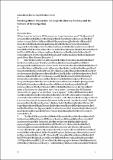Files in this item
Reading minor characters : an English literary society and its culture of investigation
Item metadata
| dc.contributor.author | Reed, Adam | |
| dc.date.accessioned | 2019-03-21T17:30:06Z | |
| dc.date.available | 2019-03-21T17:30:06Z | |
| dc.date.issued | 2019-03 | |
| dc.identifier | 252592519 | |
| dc.identifier | 61f7df58-2a0a-4fda-a805-46f585ff572f | |
| dc.identifier | 85063375391 | |
| dc.identifier.citation | Reed , A 2019 , ' Reading minor characters : an English literary society and its culture of investigation ' , PMLA , vol. 134 , no. 1 , pp. 66-80 . https://doi.org/10.1632/pmla.2019.134.1.66 | en |
| dc.identifier.issn | 0030-8129 | |
| dc.identifier.other | ORCID: /0000-0001-8917-6341/work/55643788 | |
| dc.identifier.uri | https://hdl.handle.net/10023/17342 | |
| dc.description.abstract | This essay approaches the cultures of reading anthropologically, drawing on my ethnographic research with the Henry Williamson Society to excavate the ways readers enthusiastically commit to the minor characters of Williamson’s novels. It places Alex Woloch’s literary analysis of minor characterization in dialogue with the anthropological theory of “distributed agency” developed by Alfred Gell in order to examine the idea of the reader as someone who “gives” and may in turn “receive” attention. The essay asks whether it might be more helpful to conceive of readers’ activities as a form of reading without “culture”—whether plurality, if it must be invoked, might better be located in the dynamism of the reading person. | |
| dc.format.extent | 438956 | |
| dc.language.iso | eng | |
| dc.relation.ispartof | PMLA | en |
| dc.subject | PR English literature | en |
| dc.subject | T-NDAS | en |
| dc.subject | BDC | en |
| dc.subject | R2C | en |
| dc.subject.lcc | PR | en |
| dc.title | Reading minor characters : an English literary society and its culture of investigation | en |
| dc.type | Journal article | en |
| dc.contributor.institution | University of St Andrews. Social Anthropology | en |
| dc.contributor.institution | University of St Andrews. Centre for Pacific Studies | en |
| dc.identifier.doi | 10.1632/pmla.2019.134.1.66 | |
| dc.description.status | Peer reviewed | en |
| dc.date.embargoedUntil | 2019-03-01 |
This item appears in the following Collection(s)
Items in the St Andrews Research Repository are protected by copyright, with all rights reserved, unless otherwise indicated.

